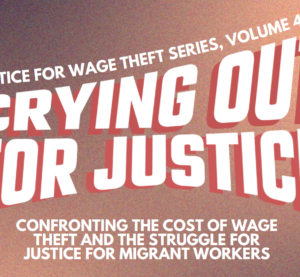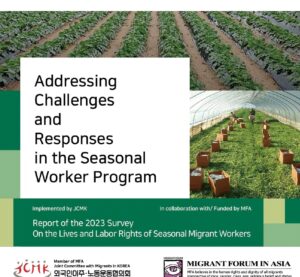Globalisation results in greater labour migration
— September 22, 2006Financial Express, September 21, 2006 – GLOBALISATION has ushered in increasing migration for labour. As International Labour Organisation (ILO) predicts, the greatest migration is also underway in Asia due to rapid economic growth of the region which is likely to be visible because of its being the place of both recipient and sending countries.
Although the migration trend has contributed to create job opportunities for a vast number of skilled and unskilled labour including women, it, however, results in decreasing the regulation of the labour market, growth in the informal sector and emergence of a new form of exploitation. Women labourers in such a situation face the worst form of discrimination, exploitation and abuse due to the migration having taken place in mostly undocumented and informal ways. The country’s female labourers also do not get by without vulnerability.
Different studies showed that the exploitation of women labourers starts from the home countries to the migrant countries. Women dominate mostly the service sector and are exploited in terms of work, pay, hours and contracts. Their freedom of movement is restricted and labour market discrimination both at home and abroad is high. Women work at risky and degrading working conditions and face gender-base violence in the workplace along with gender form racism and xenophobia. They are not allowed to be organised for their rights through law and migrants alien status.
In Bangladesh, according to a study of Bangladesh Institute of Development Studies (BIDS), despite women’s independent migration and their active contribution to the country’s economy through remittances and hard labour in the readymade garment industry, they often suffer from restrictive policy and blatant gender discrimination and other forms of marginalisation emanating from unprotected labour market.
Rita Afsar, senior research fellow of BIDS, in a survey has found that women’s contribution to the remittance is more than their male counterpart because they remit on average 72 per cent of her income to the home against the men who remit 45 to 50 per cent of their income. But there is lack of policy intervention to ensure gender equality as well as lack of access to information, communication, better training, family material resources to enjoy the overseas migration, on the part of women workers.
She has found that as maximum migration of female labour has taken place in a undocumented form, as they leave their family members including children under relatives’ or neighbours’ custody from whom they also take loan to go abroad, they face psychosomatic disorder. And this level goes up due to communication gap including language and abuse, humiliation faced by their employers. Majority women labourers do not have asset like land to manage money to go abroad and they take loans at high rates of interest.
The survey conducted by Rita Afsar on Bangladeshi migrants in the UAE discloses that women are predominantly involved in RMG sector and personal service sector for their skill developed by working in the home country in a highly segmented labour market. But they get victims of the worst kind of gender disparity.
She found that income of emigrant women of RMG sector trebled compared with what they earned prior to migration but they were more humiliated ideologically. Despite both male ad female workers of RMG sector had the same level of education (primary level) but duration of migration in the UAE was estimated at three years on an average for male and two years for women. The survey conducted in 2000 and 2002 also found that RMG sector workers enjoyed greater freedom compared with domestic helpers because they could go for shopping or to banks alone or being escorted. But compared to male colleagues, they had restricted freedom and were locked from outside in the boarding house. More than two-thirds of domestic helpers were victims of maltreatment which ranged from lack of sufficient quantity and quality of food and denial of rest hour to verbal abuse as well as beating.
According to official statistics, women migrants represent around three per cent of the total migrants. But the BIDS study claimed that there were a huge volume of undocumented workers who crossed the border which put the total number of women and young girls’ migration by late 90s more than a million. A recent population report of the UN Population Fund (UNFPA) showed that among 200 million international migrants in the world, 95 million are female. Bangladesh is one of the nine largest immigrant exporting countries after China, India, Indonesia, Myanmar, Pakistan, the Philippines, Sri Lanka and Thailand. It showed that there are 15,000 Bangladeshi women employed in Dubai in 2005.
Official statistics revealed that three-fifth of the international migration of Bangladeshi women was absorbed by the Gulf Cooperation Council (GCC) states followed by Malaysia, which alone absorbed two-fifth of women migrants. In recent years, a few other countries of South East Asia like Brunei and South Korea also appeared in the list of the recipient countries of female labour.
The overseas migration of female labours has been taken place since the government officially allowed unskilled female labour migration to aboard under some conditions. But these conditions neither were able to make the migration legal by making the employment documented nor able to support their interest in the employing countries. It was rather found that the number of deportation and sending back of female workers is also high in compared to men putting them back to the poverty level as they remain previously.
According to the UN Development Fund for Women (UNIFEM), the demand of female migrant results from a number of global forces in which gender roles and sex discrimination are intertwined with globalisation. From the perspective of women seeking work, a wide variety of factors combines to make border crossing an attractive, acceptable or – in desperate circumstances – the only viable option. Unemployment and cuts in social services in the home country are found as cause for sending many women abroad in search of newopportunities. As well, it is found that many women flee conflict or the aftermath of conflict or cross border for personal security, fleeing violence and abuse. But their absorption in the unregulated sectors including domestic work, criminalised sectors including the sex industry leave them unprotected.
The ILO explains that demand for foreign labour reflects the long-term trend of informalisation of low skilled and poorly paid jobs where irregular migrants are preferred due to their willingness to work with inferior salaries, for short period and physically demanding and dirty jobs.
The ILO also focused the issue during its latest regional meeting held in Busan of South Korea and feared about a deterioration of the working environment in the labour market. The meeting found that Asia and the Pacific region faces massive job gaps as robust growth in trade and investment and output have failed to keep pace with the growth the labour force in Asia and the Pacific. It has been estimated that 250 million workers are expected to be looking for jobs over the next decade in Asia and the Pacific region and three million people in the region will be leaving their homes every year in search of work. During the meeting, the ILO Director General, Juan Somavia expressed concern and said the gap between growth and job creation is producing a deficit in decent work and putting the brakes on efforts to reduce poverty. So in realising the decent work, the ILO identified challenges which include wage growth lags behind productivity gains, long working hours, inequalities between sexes, rising mobility of worker, unseen decline in child labour, workers safety and health, rights at work, a growing representation gap to be faced by the labour intensive countries like Bangladesh.
Sources of Bangladesh Association of International Recruiting Agency (BAIRA) said they have tried to hold the labour market for female through formal channel and training but it was not properly managed due to irregularities and mishandling by other agencies. The favourable labour market for the female workforce was created since the Philippines withdrew their labour forces from the Gulf countries on human rights and wage issues. It was found that the unskilled and illiterate female workers, having migrated, faced cultural shock and communication problem and their share of earning either was taken away by the agency people or not paid by the employer. A leader of the BAIRA also admitted that fraudulence, corruption and irregularities of service providers have turned the prospect of the market downward.
The sector players underlined some factors which include lack in dealing with vulnerabilities and exploitations owing to low budget, low capacity and low priority given to the ministry concerned, lack of role of the Bangladeshi diplomatic missions, lack of knowledge among labour about the role of the mission and lack of data-base on migrant workers and gender disaggregated data.
They found that government has to take actions regarding safety, security of the migrants including female ones through formulating a specific model contract, launching welfare fund in the employing countries, safety net programmes like insurance programme, access to family resources and link migration policy with trade of regional and global alliance and implementation of different UN conventions.



